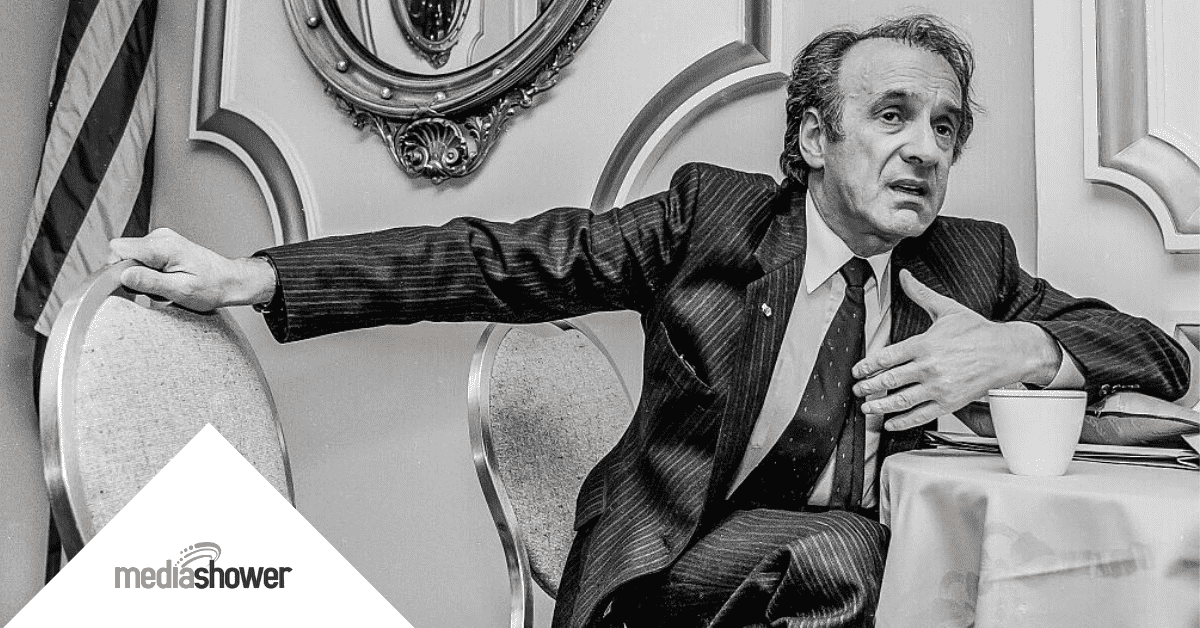
TLDR: Elie Wiesel gave his famous speech, “The Perils of Indifference,” on the cusp of a new millennium and asked his hearers not to repeat the mistakes of the past.
So What? He used powerful techniques including engaging personal narratives, asking rhetorical questions, and making complex ideas accessible to inspire his audience to action.
After a harrowing childhood in Nazi Germany, including time spent surviving imprisonment in the Auschwitz and Buchenwald concentration camps, Elie Wiesel spent his adult years reflecting on his experience and sharing it with the world.
He wrote 57 books, starting with his memoir, Night, and spoke publicly about his experiences, sharing questions of hope and hopelessness, and his reflections on the human condition.
His 1999 speech “The Perils of Indifference” was delivered at the White House at the invitation of then-First Lady Hillary Clinton as part of the Millennial Lectures series in advance of the new century.
Wiesel’s speech was a powerful statement fueled by Wiesel’s own personal story (and the stories of others), facilitating engagement with the audience over our responsibility to confront hatred and fear to maintain hope. He also asked rhetorical questions to get the audience to think through his ideas, and his authenticity created a sense of urgency for his hearers to act to prevent atrocities like the Holocaust from happening again.
Here’s what great communicators can learn from this incredible speech.
Emotional Engagement Through Personal Narratives
The speech, ironically, starts with a discussion of gratitude. Wiesel’s story of himself as a boy, liberated from Buchenwald concentration camp at the age of 16, is one where he remembers seeing the looks on the faces of US soldiers and feeling grateful that others would have the rage and compassion he saw there. He hoped that they would “bear witness” to what happened in a way that could motivate action.
The opposite of this hope, Wiesel says, is indifference. “Indifference is always the friend of the enemy, for it benefits the aggressor,” he stated, “never his victim, whose pain is magnified when he or she feels forgotten… In denying their humanity, we betray our own.”
That is, indifference is just as bad as that to which we are indifferent, because it requires us to deny our own moral compass to ignore what is happening (or what has already happened).
Provoking Critical Thinking with Rhetorical Questions

It’s through the topic of indifference that Wiesel asks his audience to think through their moral response to indifference. “What are we doing to stop preventable diseases and famine? To stop wars and the arms trade?” he asks.
This is a strong rhetorical tactic… by initially sharing his story and then asking the audience to consider their emotional response to it as compared to current events, he’s suggesting that one of the most significant moral challenges we face individually is indifference.
He then juxtaposes these questions with counterexamples:
“And yet, my friends, good things have also happened in this traumatic century: the defeat of Nazism, the collapse of communism, the rebirth of Israel on its ancestral soil, the demise of apartheid, Israel’s peace treaty with Egypt, the peace accord in Ireland. And let us remember the meeting, filled with drama and emotion, between Rabin and Arafat that you, Mr. President, convened in this very place. I was here, and I will never forget it.”
His point isn’t just mired in the misery of his experience but the hope that he sees coming out of it. When good people are not indifferent, then good happens. People are freed, and peace is found.
Creating a Sense of Hope
Wiesel’s speech created a sense of urgency among his listeners as he described events worldwide that, as he suggests, demand that we cast aside our indifference to address them. In that space, there is hope.
As he ends the speech, he states:
“And again, I think of the young Jewish boy from the Carpathian Mountains. He has accompanied the old man I have become throughout these years of quest and struggle. And together, we walk towards the new millennium, carried by profound fear and extraordinary hope.”
Fear and hope are two sides of the same coin when looking into the future. There is an unknown quality to it. But if we are aware of the perils of indifference, we can count more on hope in facing that fear–coming together to create a better world by standing firm against violence and domination.
Reflecting on the Power of Language
When communicating important messages to others, Wiesel’s speech techniques can also help us. Telling our authentic story and asking thought-provoking questions will draw our audience in and help them understand what we need from them in response.
If you need help crafting an authentic message that resonates powerfully with your target audience, Media Shower knows how to help. Marketers, meet your master plan.
